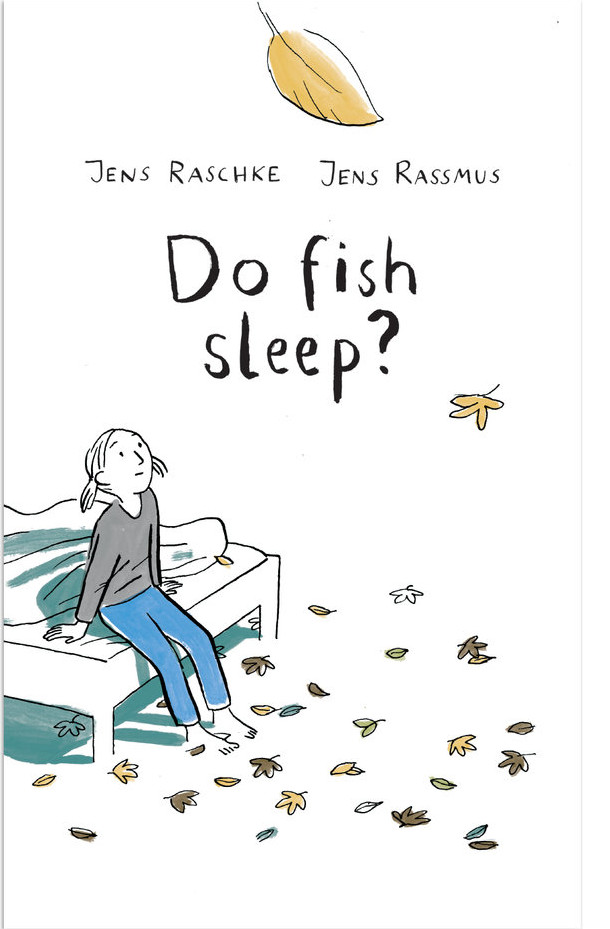
Do Fish Sleep?
Written by Jens Raschke
Illustrated by Jens Rassmus
Translated from German by Belinda Cooper
Enchanted Lion, 2019, 60pp
ISBN: 978-1-59270-285-5
Jette sits on a bench, reflecting on getting one year older to reach the double-digit age of 10. Her brother will only get to be a single digit, six, his age when he passed away from a terminal illness. Jette struggles with feelings of grief and confusion that sometimes threaten to overwhelm her as she searches for answers. She recalls her brother’s death and funeral as well as the special times she shared with him, including a frank discussion in which she tells him that heaven is a place where he can eat all the pizza he wants. The title of the book comes from several years earlier at the beach when she questioned her father about whether fish sleep. He mumbled a reply, a behavior now repeated by adults who act as if they know the answer to what happens after death, when they are actually unsure. This book acknowledges that children need ways to deal with life’s big questions and challenges adults who offer surface-level answers that fail to respect children’s ability to understand complexity and uncertainty.
This honest story of pain and grief over a sibling’s death is narrated in first-person by Jette and illustrated with cartoonish drawings that accentuate the darkly humorous tone of her voice. Jette’s strong voice reflects the story’s origin as a one-girl play by the author, a playwright in Germany. A breakout success at the box office, the play received a 2012 Mülheimer Children’s Theater Prize and the 2014 MDR Children’s Radio Play Prize. The book is a best-seller in Germany and has been translated into several languages.
This honest and compelling portrayal of death and loss received a 2019 Batchelder Honor award. Another book that portrays children wrestling with death is Cry, Heart, But Never Break (Glenn Ringtved and Charlotte Pardi, 2016), where a group of children try to keep Death from taking their grandmother away until they realize death is not something to fear. This translation from Danish received the 2017 Batchelder award. Children find ways to celebrate the life of someone they have lost. In Finn’s Feather (Rachel Noble and Zoey Abbott, 2018), a boy finds joy as he plays with a feather he believes was sent by his deceased brother, while The Funeral (Matt James, 2018) focuses on the play of young cousins at a funeral for a great uncle. Death is viewed within the circle of life in An Ordinary Day (Elena Arnold, 2020) in an ordinary neighborhood that turns out to be extraordinary. In Maybe Tomorrow? (Charlotte Agell and Ana Ramirez, 2019), Elba carries a heavy black suitcase of grief and sadness wherever she goes until she meets a friend who helps her let go of the heavy load. These picturebooks provide a text set to surround the reading of Do Fish Sleep? in powerful and moving ways. In addition, many novels deal with the death of a young person, including Kira-Kira (Cynthia Kadohata, 2004) and The Thing About Jellyfish (Ali Benjamin, 2015), while Ways to Live Forever (Sally Nicholls, 2008) is a diary written in the voice of a boy who has a terminal illness.
The author, Jens Raschke, is a well-known German author and children’s theater playwright, who has received numerous drama awards. His most well-known play is Do Fish Sleep? Another play, What the Rhinoceros Saw When It Looked at the Other Side, won the German Children’s Theater Prize and the Dutch-German Children’s and Youth Drama Award. It deals with the tyranny of the Nazi era in a form accessible to children through focusing on a zoo in Buchenwald where children and animals look over the fence into a concentration camp. Raschke has been a festival organizer, cultural critic, playwright, and theater director.
Jans Rassmus is a draftsman, illustrator, and author from Kiel who studied illustration at the Hamburg HAW and the Duncan of Jordanstone College of Art in Dundee, Scotland. He has illustrated and written many other books, including illustrating I Need All of It (Petra Postert, 2018), about a boy who tells his father tales of why he needs to keep three objects found in his pocket at laundry time. His techniques range from large-scale paintings with acrylic to delicate watercolor and pen drawings. The two-toned drawings for this book are reserved and sharp-edged images that work with the text to interrupt and comment on each other.
The translator, Belinda Cooper, is an adjunct professor at NYU’s Center for Global Affairs and Columbia University’s Institute for the Study of Human Rights, where she teaches courses on human rights, international and transitional justice, and human’s rights. She lived in Berlin, Germany for many years and worked closely with members of the East German opposition before the fall of the Berlin Wall. She has translated German-language books and articles for over 25 years, including many texts on Nazi Germany and the Holocaust and international criminal law.
Kathy Short, University of Arizona
WOW Review, Volume XII, Issue 3 by Worlds of Words is licensed under a Creative Commons Attribution-NonCommercial-ShareAlike 4.0 International License. Based on work at https://wowlit.org/on-line-publications/review/xiii-3/
